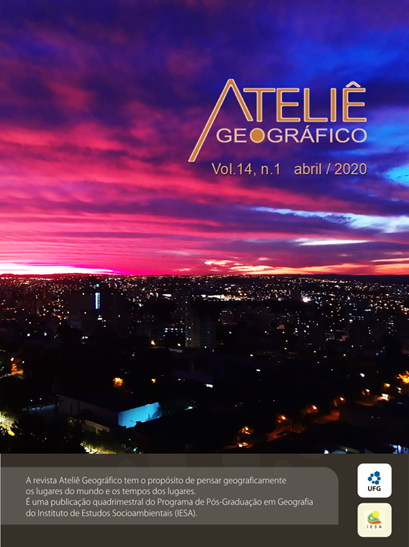Geoparticipatory mapping: approaches for establishing participatory water management in times of water crisis using the 3P methodology
DOI:
https://doi.org/10.5216/ag.v14i1.55864Abstract
In a context of "water crisis", one must ask: what is the role of geographic education regarding this subject matter? On the one hand, human actions have decisively influenced the incidence of factors that result in the "Crisis". On the other hand, contradictorily, non-actions have also contributed in leading to it. How? “Non-actions” comprise estrangement and lack of participatory processes within schools, from the consciousness about the dynamism of territories – encompassing waters – to the involvement of people in territory management decision-making. Pedagogical immobility, thus, contributes to this scenario. In this sense, we present a methodology to address issues related to the discussion and analysis of drainage basins by means of a set of geographic educational practices: 3P: recognize Problem (1P), observe Potentiality (2P) and see Possibility (3P). As a result, we analyze challenging issues related to the time of application, infrastructure, and the gap between geographic and technological knowledge. 3P has educational potential, not only for aiding in the understanding of spatiality and the dynamics of the hydrographic territory, but also in building a critical view of its transformations.
Keywords: Geoparticipatory mapping 3P, Geography, water management.
Downloads
Downloads
Published
How to Cite
Issue
Section
License
Autores que publicam nesta revista concordam com os seguintes termos:- Autores mantém os direitos autorais e concedem à revista o direito de primeira publicação, com o trabalho simultaneamente licenciado sob a Licença Creative Commons Attribution que permite o compartilhamento do trabalho com reconhecimento da autoria e publicação inicial nesta revista.
- Os autores não serão remunerados pela publicação de trabalhos na Revista Ateliê Geográfico. Além disso, os conteúdos publicados são de inteira e exclusiva responsabilidade de seus autores, ainda que reservado aos editores o direito de proceder a ajustes textuais e de adequação às normas da publicação.
- Autores têm permissão e são estimulados a divulgar seu trabalho online (ex.: em repositórios institucionais ou na sua página pessoal), já que isso pode gerar alterações produtivas, bem como aumentar o impacto e a citação do trabalho publicado (Veja O Efeito do Acesso Livre).


